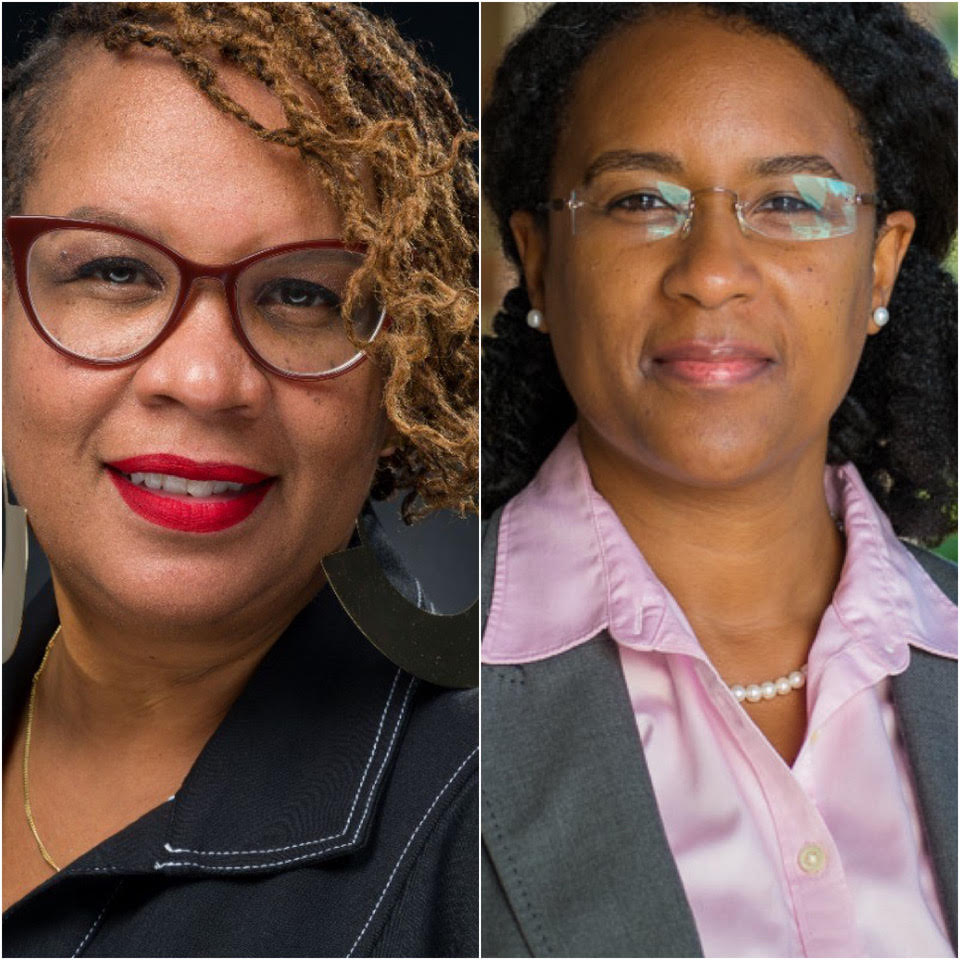Kellie Todd Griffin, President and CEO of the California Black Women’s Collective Empowerment Institute (CBWCEI) (left) and Shakari Byerly, Managing Partner, EVITARUS (right).
Antonio Ray Harvey| California Black Media
A study released last week by the California Black Women’s Collective Empowerment Institute (CBWCEI) presents a grim picture of the financial stability of Black women voters in the state.
A total of 1,258 women participated in the poll used in the study. Their answers give insight into the web of challenges Black women across California confront daily.
“Black women in California and around the country are struggling socially and economically while serving as primary breadwinners of their households,” said Kellie Todd Griffin, President and CEO of CBWCEI. “The results are sobering and paint a picture of the pressures that threaten Black women’s stability and financial security. This data is a call to action for meaningful change to policymakers, advocates and community leaders to address these pressing issues and disparity gaps.”
The survey conducted by EVITARUS, a Black-owned public opinion research and public policy consulting firm based in Los Angeles, provides an in-depth analysis of Black women’s opinions about state and federal elected officials. It also reveals CBWCEI’s top policy priorities for enhancing the well-being of women and girls in California.
Top among the issues Black women face are racial discrimination, lack of opportunities for career advancement, adverse mental and physical health conditions, pay inequity, parenting challenges, among other serious issues.
EVITARUS Managing Partner Shakari Byerly served as the principal investigator and lead researcher on the study. She said the survey reveals the financial and economic burdens that Black women confront as they contribute to their families, communities and the state.
Griffin, Byerly, Assemblymember Lori D. Wilson (D-Suisun City), and Dr. Thomas A. Parham, President, California State University Dominguez Hills held a virtual media briefing on Aug. 8 to discuss the study’s results.
“This type of project is exactly why the California Legislative Black Caucus (CLBC) pushed to have the California Black women think tank funded through the legislature,” said Wilson, who chairs the CLBC. “California Black Women’s Collective Empowerment Institute received $5 million in funding from Gov. (Gavin) Newsom to launch this first-ever think tank to focus on Black women in California.”
Titled “The California Black Women Voters’ Quality of Life Survey,” the 26-slide PowerPoint presentation makes public the opinions of Black women who took the survey between May 24 and June 6.
The results reflect political party, age, profession, income, and geographical and other demographic information about the participants.
Byerly said EVITARUS had “good coverage” in terms of selecting women who were eligible and active voters. Eighty percent of the women who took the poll voted in the November 2022 General Election.
“We have a probability-based model used for who might be identified as Black, but then we also had a pool of the general voting public who were allowed to participate,” Byerly said. “We did a screen to determine whether they identified as Black and also as a woman, either they were cisgender or transgender.”
Approximately 40% of those polled stated that systematic racism and discrimination have hampered their income and earning abilities, which sheds a light on the structural inequalities faced by Black women, according to the survey.
Not having enough cash saved for retirement (77%), maintaining or achieving financial stability (76%) and being unable to make ends meet (70%) were among primary concerns.
Nearly two-thirds of Black women reported having difficulty coping with stress, reflecting the emotional toll of navigating social and economic pressures.
The study found that nearly 2 in 5 Black women work multiple jobs yet still struggle to meet basic expenses. The researchers say this is due to inflation and the rising cost of living in California. Among Black women who are employed, two-thirds are the primary breadwinners in their households.
In addition, 89% of Black women emphasized the importance of having Black representatives in elected office, reflecting their desire for diverse and inclusive political leadership. Among California’s 2.5 million Black population, Wilson said there are over 1 million Black women and girls in the state.
Assembly Bill (AB) 179, which was championed by Wilson, paved the way for the creation of CBWCEI, a non-profit “think tank” focused on improving structures and practices that impact the lives of Black women and girls across the state.
Gov. Gavin Newsom signed a trailer budget legislation in September 2022 allowing the think tank to receive $5 million from the state to conduct such studies. The think tank is housed at California State University at Dominguez Hills.
CBWCEI also serves as a resource for lawmakers, elected officials, business leaders, and advocacy organizations. The poll on Black women voters is the first public project of the think tank.
“It is essential that we do all that we can to protect them,” Wilson said. “We need real data on the experiences of Black women so that the legislators, anyone involved in advocacy positions, can make meaningful policies that would drive the change we need to improve their lives.”







